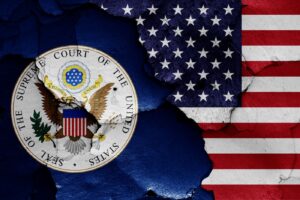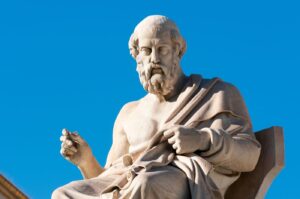Wahhabi teachings have been present in American mosques for decades (they were exported here by our Saudi friends and allies). And yet, American Muslims have seemed relatively immune, certainly in comparison to their counterparts in Western Europe, who have been far more easily radicalized. As I have written elsewhere, the assimilation of U.S. Muslims has certainly resulted, at least in part, from our system of religious freedom. Muslims are free here, like generations of religious settlers on American shores, to worship privately and act publicly on the basis of their religious beliefs. They do not hate Jews or other non-Muslims. They do not seek anti-blasphemy or anti-apostasy laws, or stonings, or amputations. More to the point, they have no interest in destroying the country that they love.
The forcing bed of this nation’s most mortal threat is a multifaceted idea. It is the idea that the God of Islam wills torture and death—not just for adultery, but for acts such as apostasy, blasphemy, defamation of Islam, or conversion from Islam to another faith. It is the idea that women, Jews and other non-Muslims, and disfavored Muslims, are less than human in God’s eyes, some deserving of slaughter. It is the idea that America, and especially its system of religious freedom, is the enemy of God and of Islam.
Most Americans will accept—are eager to accept—that this idea is a distortion of Islam. They do not believe it is embraced by their Muslim neighbors. They want to support Muslims who reject it, whether they live in America or abroad.
Some analysts have argued that this anti-radical immunization of American Muslims is weakening, or that it was always an illusion. Robert Spencer, Daniel Pipes, and others have consistently sounded the alarm that indigenous Islamist extremism is a clear and present danger to the United States. And they do not lack evidence: U.S. Army Major Nidal Malik Hassan’s massacre of innocents at Fort Hood, his connection to American citizen Anwar Al-Awlaki, now in Yemen recruiting Islamist terrorists, or native Californian Adam Gadahn, who has become a spokesman for Al Qaeda. As U.S. Ambassador for Counter-Terrorism Dan Benjamin put it bluntly last month, “The assumption that Americans have some special immunity to al-Qaida’s ideology [has been] dispelled.”
I’m uneasy with that logic. It seems to me that religious freedom remains a vital and highly effective bulwark against the radicalization of American Muslims. Indeed, U.S. foreign policy should be far more interested in advancing religious freedom abroad—especially in the lands of Islam—and American conservatives should be far more assiduous in supporting such a policy.
Start your day with Public Discourse
Sign up and get our daily essays sent straight to your inbox.But Americans also instinctively know that the idea provides a theological warrant for Al Qaeda and others who threaten them and their children. Osama bin Laden was weaned on Wahhabism—the Saudi version of this perverse and anti-human political theology. Wahhabism was the school of his adolescence and his early adult years, from which he graduated to do even greater things in God’s name.
America has historically been strengthened by its diverse and vigorous religious communities. Our founders understood this well, and acted resolutely to encourage the involvement of religious ideas and actors in American public life. With the First Amendment they ensured the right to worship and to act on the basis of religious belief, in full equality with other citizens and communities, religious or not. Importantly, our system also requires religious groups to accept the limits imposed by democracy, including the principle of equality under the law. Generations of religious immigrants have been enticed by the bargain of democracy, accepting its limits in return for the opportunity to live their lives—privately and publicly—in accord with their beliefs.
In short, the American experience teaches that religious liberty can be an effective way to engage religious actors in the project of self governance, and to forestall religion-based violence and terrorism. This is why religious freedom should be at the forefront of our counter-terrorism diplomacy. It is no accident that where religious freedom does not exist, or is under siege, Islamist terrorism is incubated, nourished, and exported, including to American shores.
A recent Pew Forum study shows that 70 percent of the world’s population lives in nations where religious liberty is severely restricted, most of them Muslim-majority nations. Extremist policies such as anti-blasphemy and anti-apostasy laws fuel the persecution of Christians in countries like Iraq, Afghanistan, and Saudi Arabia, and the cruel repression of Muslim minorities in Pakistan and Iran. The absence of religious freedom prevents the emergence of Muslim reformers who oppose religion-based persecution and who are capable of developing a liberal Islamic political theology.
Unfortunately, American foreign policy has long been complicit in supporting authoritarian regimes in Muslim nations. It has also been lethargic and inept in advancing international religious freedom—even though it is required by law to do so—including in Iraq and Afghanistan. The Obama administration has been especially negligent on this score, failing even to mention religious freedom in its National Security Strategy. Almost two years into the President’s tenure, the senior State Department official responsible for promoting religious freedom abroad is still not in place. As I have argued here and here, the State Department has apparently concluded that the vigorous defense of religious liberty in Muslim-majority nations will offend Muslims and be resisted by their governments.
Of course religious liberty will be opposed by Muslim governments that are authoritarian or theocratic. Even democratic states will resist if they feel threatened. But polls show that Muslims themselves deeply desire religious freedom, and social science is demonstrating that democracy cannot be sustained, especially in highly religious societies, without the right to religious freedom. The idea that we should not assist Muslim nations in procuring it is both preposterous and dangerous. Our policy must change, and American Muslims should be leading the charge to change it.
In sum, if we are to help Muslim reformers win the war of ideas, and to kill the extremist, malevolent idea that threatens America, we must protect religious liberty in the homeland, and advance it in the lands where true extremism abides. Our security depends on it.
This article is the second of two installments. You can find the first installment here.









